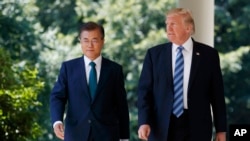Even though South Korean President Moon Jae-in seems to have more closely aligned with the hardline U.S. approach to pressure Pyongyang into giving up its nuclear program, his government in Seoul is planning to send $8 million in humanitarian aid to North Korea.
“It is our government basic stance that (the government) will continue to provide humanitarian aid for children, pregnant women and vulnerable social groups regardless of the political situation,” said South Korean Unification Ministry spokesman Baik Tae-hyun on Monday.
When the liberal leader and former human rights lawyer took office in May, following the impeachment of the conservative President Park Geun-hye on corruption and bribery charges, Moon embraced a dual track approach to balance economic sanctions with outreach to North Korea to ease tensions over time.
Sanctions pivot
However following North Korea’s sixth nuclear test earlier this month, the Moon administration indicated it would pivot away from engagement to more fully support U.S. President Donald Trump’s “maximum pressure” strategy that emphasizes strong economic sanctions along with the threat of military action to force the Kim Jong Un government in Pyongyang to give up its nuclear weapons or face a possible collapse.
The South Korean president has since come out strongly in support of the latest U.N. sanctions, which U.S. Ambassador to the United Nations Nikki Haley said cuts “90 percent of trade and 30 percent of oil” imports to North Korea. He also tried to persuade Russian President Vladimir Putin to support a total oil embargo on North Korea, but neither Moscow nor Beijing were willing to support such a potentially destabilizing measure.
After North Korea fired another ballistic missile over Japan on Friday, Moon said “dialogue is impossible” with Pyongyang as long as it continues its provocative ways.
On Monday, President Moon Jae-in said his government seeks to inflict “powerful punishment" on North Korea to make clear that Pyongyang has “no other choice but to give up its nuclear weapons and missiles.”
Humanitarian aid
While President Moon has in the short term prioritized support for his U.S. ally’s get tough approach on North Korea, analysts say he remains committed to finding a long-term peaceful resolution to the nuclear crisis, which is also a stated goal for Washington as well.
“It is not either-or, but both countries need to achieve both goals,” said North Korea analyst Bong Young-shik, with the Yonsei University Institute for North Korean Studies in Seoul.
The Unification Ministry defended its humanitarian aid plan as “separate from sanctions and pressure” and needed to help North Koreans who already live in poverty, and who will be made more vulnerable by the U.N. sanctions.
South Korea plans to donate $4.5 million to help the World Food Program provide food aid to North Korean hospitals, and $3.5 million to the United Nations Children’s Fund for medicine and nutrition to help children and pregnant women.
The donations to U.N. relief organizations would restore South Korean humanitarian aid to the North that was suspended in 2016 following Pyongyang's fourth nuclear test. North Korea rejected earlier offers of assistance and cooperation from Seoul.
The Moon administration also pointed out U.S. and Russia provided millions of dollars in the last year for humanitarian assistance to North Korea through the same U.N. agencies.
But Yoshihide Suga, Japan’s chief cabinet secretary, said last week, providing aid to North Korea could undermine international efforts to pressure Pyongyang.
Providing humanitarian aid, Moon’s critics say, will minimize the impact of the sanctions and help to stabilize the Kim government as it continues to focus its resources and revenue into nuclear and missile development.
“South Korea's decision to send humanitarian aid to North Korea is nothing different from sending medication for casualties to an enemy country,” said North Korean defector and analyst Ahn Chan-il with the World Institute for North Korean Studies in Seoul.
South Korean opposition parties also criticized the timing of the aid announcement last week, just after international sanctions were imposed.
There are also concerns President Moon’s aid outreach will again draw criticism from President Trump, who recently called his engagement-oriented approach unworkable “appeasement.”







